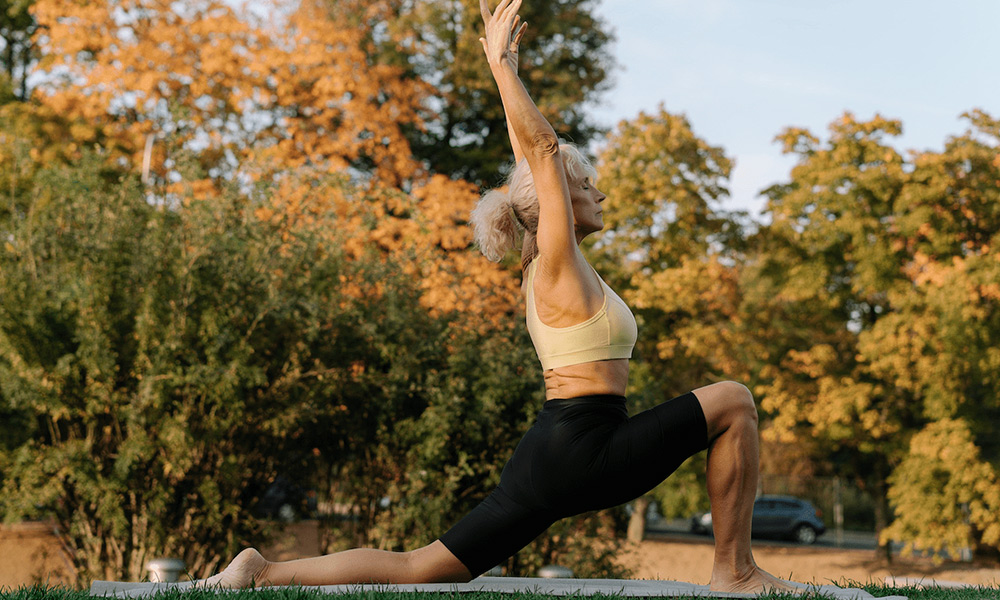Exercise and fitness are crucial for living a healthy lifestyle at any age, but it’s especially important for adults who want to maintain their mental and physical health as they get older. However, creating an enjoyable and effective exercise routine can be challenging. Discomfort, pain, reduction in muscle mass, or lingering injuries are just a few obstacles that make it difficult to find an exercise routine that works.
At Survivor Fitness, we’ve worked with cancer survivors of all ages to help people implement an individualized fitness plan. We partner with skilled personal trainers who design sustainable exercise routines for participants based on their age, fitness level, and the impact of their cancer treatment.
The Centers for Disease Control and Prevention recommend that all adults get 150 minutes of moderate-intensity exercise each week, regardless of age. As you get older, the way you approach exercise should evolve based on how your body has changed. For example, maintaining a healthy weight becomes a real struggle as people enter their 40s, but high-impact cardio exercises like running can damage joints. Chronic aches and pains can begin to cause problems once people reach 50, which can mean finding different exercise routines that help mitigate those issues.
Your exercise routines will evolve as you age, and understanding that concept is key to maintaining a healthy and active lifestyle. Your approach to fitness should give you energy and increase longevity rather than cause damage to your body. As you look for ways to adapt your exercise routine, here are a few helpful best practices to consider:
Strength: Focus on Your Core with Pattern-Based Training
Maintaining strength is a priority for men and women as they age. But as you get older, weightlifting can be replaced with controlled reps and movement patterns that help you build a solid foundation of strength. For example, instead of lifting weights on a bench press, you might consider standing press exercises that utilize your body weight for resistance. There are many ways you can modify an exercise to fit your current fitness level.
Incorporate Mobility & Agility Exercises into Your Routine
Mobility, agility, and balance become increasingly important as you age. Whether you’ve dealt with an injury or you’re experiencing the natural stiffness that comes with age, it can be helpful to incorporate specific exercises that enhance your agility. It’s also important to maintain balance to prevent falls and other injuries. Start small and work up to balancing, jumping, or doing strength training exercises on one foot.
Be Intentional with Your Warm Up & Recovery
The first challenge that active people typically notice is that it takes longer to recover from exercise as you age. Soreness after running a half-marathon might linger for a few more days than it did in your twenties. Giving your body more time to rest after exercise is important. Dividing physical tasks into manageable intervals can also help you incorporate recovery into your routine. Stretching before and after a workout is another important habit. In many cases, the way you warm up and recover is just as important as the way you exercise.
Build an Exercise Routine that Works for You
While incorporating new habits is a good idea, the key to sustainable, lifelong fitness is to find an activity that fits your unique needs, goals, and lifestyle. There are questions you can ask yourself to help you determine the right match for you, including:
What are your current physical capabilities? What challenges or limits are you facing? Are there other factors, such as work demands or family responsibilities, that could impact your exercise routines?
All of these are important questions to consider as you look to adapt your fitness habits as you age. Trying new activities can also unlock new and unexpected opportunities like incorporating fun workouts to do with your spouse or creative indoor exercises into your routine.
Need Guidance Adapting Your Exercise Routine?
As with any fitness-related goal, it can be helpful to talk with your doctor or a trained professional to answer any questions you might have.
If you’re a cancer survivor, the Survivor Fitness approach is designed to help you regain your health and wellness through one-on-one personal training and nutritional support. We walk alongside you to provide you with the tools you need to get the most out of your recovery. Contact us today to learn more!


